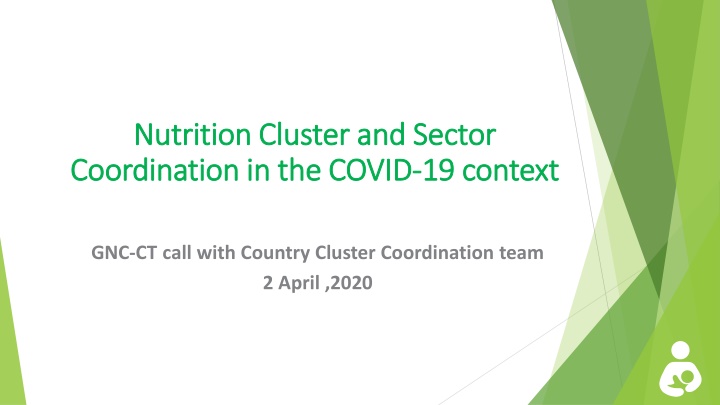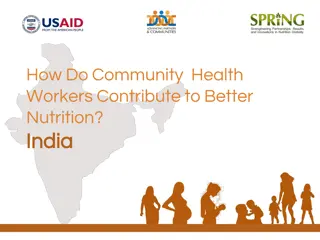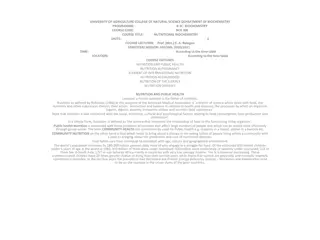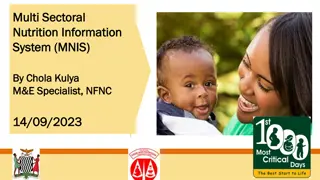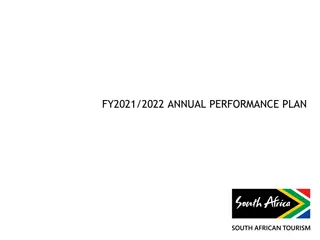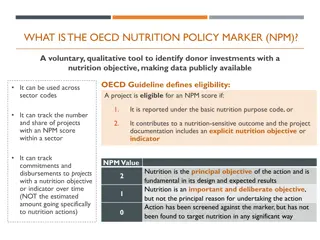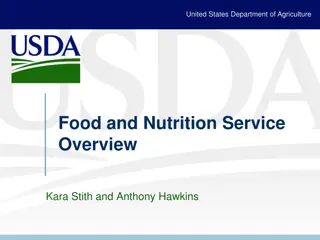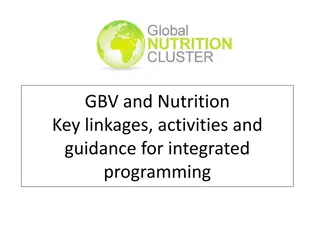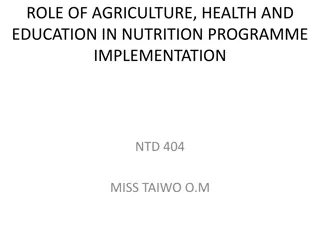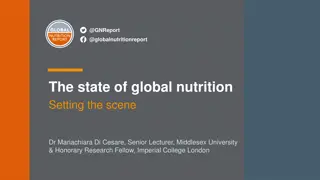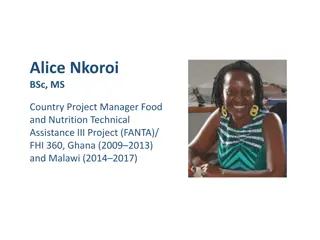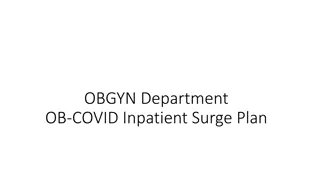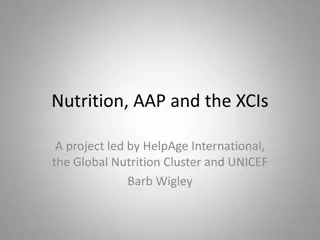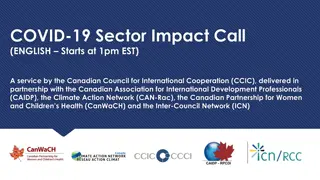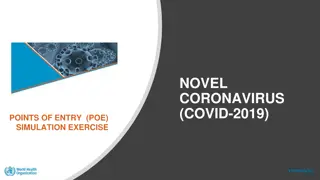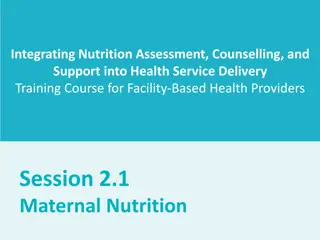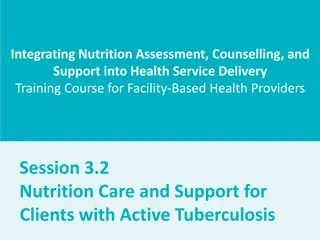COVID-19 Impact on Nutrition Sector and Global Response Plan Overview
Discusses the impact of COVID-19 on nutrition sectors, including direct health effects, socioeconomic implications, and effects on livelihoods and food security. It also outlines the global and national COVID-19 response plan revisions, recommended actions for country coordination, and strategies to address nutrition challenges amid the pandemic.
Download Presentation

Please find below an Image/Link to download the presentation.
The content on the website is provided AS IS for your information and personal use only. It may not be sold, licensed, or shared on other websites without obtaining consent from the author.If you encounter any issues during the download, it is possible that the publisher has removed the file from their server.
You are allowed to download the files provided on this website for personal or commercial use, subject to the condition that they are used lawfully. All files are the property of their respective owners.
The content on the website is provided AS IS for your information and personal use only. It may not be sold, licensed, or shared on other websites without obtaining consent from the author.
E N D
Presentation Transcript
Nutrition Cluster and Sector Nutrition Cluster and Sector Coordination in the COVID Coordination in the COVID- -19 context 19 context GNC-CT call with Country Cluster Coordination team 2 April ,2020
Objective of the call Objective of the call To give a global overview of the current and expected COVID 19 impact on nutrition To share the current available coordination and service delivery guidance, technical briefs and platforms on COVID 19 and nutrition To discuss key country cluster/sector coordination challenges and GNC-CT support over the coming 3 months
Overview of COVID 19 and its impact on nutrition Overview of COVID 19 and its impact on nutrition Direct impact Health effects on people: Mortality, decrease in treatment of other diseases, fewer prevention services, diversion of funds and resources from nutrition programs, etc. Indirect socioeconomic impact Macroeconomic effects: Effect on economic growth, industrial production, supply chains, international trade, social programs fund cuts/reductions, food and agriculture sector, etc. Livelihoods and food security: Unemployment, and food insecurity for the most vulnerable, etc. Effects of protection and rights, education: Because of mobility restrictions e.g. on asylum seekers, school closures.
Global and national COVID-19 response plan revision Global COVID -19 HRP In countries with existing HRPs, RRPs, and other priority countries. Focuses on preparedness and response to the initial immediate and urgent health and non-health needs. It does not attempt to deal with secondary or tertiary issues related to macroeconomic effects or more longer- term requirements in various sectors. Preparation for revision of country HRPs Preparation for revision of country HRPs Some activities included in the current HRPs might have to be revised / reprioritized or scaled down or up, due to changes in needs and operational constraints. Countries are advised to follow three-pronged strategy of the global HRP adapting to the country specific situation. This may include: o objective 1 contain the spread implementing IPC measures at health facility, distribution sites, community level, during meetings etc. o objective 2 decrease the deterioration continuation of essential nutrition services, preventing out of stocks, planning for increased admissions to OTP and SC and/or less bed capacity, staff, supplies. o objective 3 protect the most vulnerable categories advocate for malnourished people as at-risk category of covid19 complications.
Recommended Actions for in Recommended Actions for in- -country coordination of COVID19 response country coordination of COVID19 response COVID19 is a standing item on ICCG and HCTs. Ensure each cluster has a COVID19 focal point. Cluster need to link up with national (government-led) response. Engage in the development and implementation of the COVID19 Strategic Preparedness and Response plan. Support multi-sectoral National Health Emergency Coordination mechanisms. Make sector-specific risk assessments and contingency plans to continue service delivery, including in cases where new emergencies arise while COVID19 is affecting the country. Populations at risk are identified, especially vulnerable groups (e.g. children with wasting, elderly, etc.) or persons who may be at greater protection risk. Clusters review the need for travel to attend coordination or capacity building meetings. Full use is made of technology to avoid exposure or transmission, as appropriate in individual contexts.
Nutrition Coordination in Context of COVID 19 Nutrition Coordination in Context of COVID 19 Scenario 1: Scenario 2 : No population mobility restrictions Partial or full population mobility restrictions Establish a COVID-19 and Nutrition Task Force Ensure each cluster has a COVID-19 focal point Ensure access to the latest GNC and GTAM guidance Issue COVID-19 IYCF-E joint statement Core Function /activities Recommended Action Recommended Action Replace with virtual meetings as much as possible Do trainings for more than 20 people. Mitigation measures in place for the face-to-face trainings All meetings online or through conference services. All trainings to be conducted online/virtually Meetings and trainings Prioritize only critical assessments Put mitigation measures should be implemented to minimize transmission Explore possibility for data collection by phone Cancel all assessments and replace them with secondary data analysis data collection by phone Assessments Apply Wasting programming in the context of COVID-19 and IYCF and COVID 19 guidance recommendations in service delivery Develop contingency plan Based on the analysis of the impact of COVID 19 on nutrition ,revise the HRP 2020 as required Plan and implement cluster strategies Review nutrition on-site monitoring modalities and identify what needs to be done to be prepared to conduct monitoring remotely On-site monitoring to be conducted remotely using technology wherever possible Monitoring Develop and distribute advocacy messages on COVID and nutrition Develop and distribute advocacy messages on COVID and nutrition Advocacy, community engagement ,accountability ,inclusion
Establishing COVID-19 Nutrition TWG The COVID19 and Nutrition TWG is a sub-group of the nutrition cluster or sector coordination mechanisms, with the task to guide the implementation and monitoring of programmatic measure to reduce nutrition- related mortality and morbidity as a result of COVID19 impact on public health, economy and social aspects. Provide guidance for the contextual adaptation and implementation of available guidelines, toolboxes, multimedia and other tools necessary for implementation of mitigation measures in nutrition programs in COVID19 at-risk or affected areas for nutrition sector or cluster partners. Ensure that there is a Joint Statement issued and/or endorsed by nutrition cluster or sector members on appropriate COVID19 and IYCF-E mitigation measures. Develop a contingency plan for nutrition interventions for both preventive and curative measure and ensure that both service provision and supply chain management are adequately considered as per UNICEF Nutrition COVID-19 programme guidance. Develop a community engagement strategy, workplan, guidance and tools for COVID19 and nutrition in emergencies programmes. Review current programmatic data collection practices and identify what needs to be done to implement no-touch data collection, particularly in terms of anthropometry, and reporting.
Technical briefs available to adapt service delivery MANAGEMENT OF CHILD WASTING IN THE CONTEXT OF COVID-19 (27 March 2020) INFANT & YOUNG CHILD FEEDING IN THE CONTEXT OF COVID-19 (30 March 2020) Template Joint Statement on Infant and Young Child Feeding in the Context of COVID-19 Pandemic GTAM list of resources 13 March 2020, a new version coming out soon GNC website repository for the available global guidance and the briefs Briefs are regularly updated as the situation evolves
GNC-CT Support to Countries In-country support The GNC-CT provides in country support through deployments. Capacity development The GNC-CT can organize or provide support for training and capacity building actions at country, regional and global level, for different profiles and capacity levels. Remote support The GNC-CT currently includes 6 Helpdesks who can provide fast and highly specialized support to countries. Helpdesk: One-on-one calls, webinars Rapid Response Team Deployment, Anteneh Dobamo adobamo@unicef.org Trainings include: Information Management Coordination Awareness Inter-cluster training for nutrition outcome Harmonized Training Packages Contact: Anteneh Dobamo, adobamo@unicef.org Coordination, David Rizzi drizzi@unicef.org Standby Partners Staff Deployment, Lauren Cheshire lcheshire@unicef.org Inter-cluster, Danka Panchova dpanchova@unicef.org Nutrition Cluster Coordination training, Danka Panchova dpanchova@unicef.org Nutrition Information System, Victoria Sauveplane vsauveplane@unicef.org Technical Rapid Response Team Deployment, Ben Allen ballen@internationalmedicalcorps.org Information Management, Shabib Al Qobati salqobati@unicef.org Mentoring program, Anteneh Dobamo adobamo@unicef.org Global Technical Assistance Mechanism for Nutrition (GTAM) Roster, gtamroster@unicef.org Nutrition in Emergencies Technical, Yara Sfeir ysfeir@unicef.org The COVID-19 pandemic is limiting mobility in all countries therefore the GNC-CT will endeavour to limit all face-to-face interactions and increase the modalities and opportunities for remote support, for the foreseeable future. Cash and voucher assistance, Andre Durr andurr@unicef.org UNICEF internal surge and stretch assignments, Anteneh Dobamo adobamo@unicef.org Guidance and tools readily available online, including but not limited to: 1. Coordination and information management toolkits 2. Coordination and information management checklists 3. Nutrition in emergencies technical checklists Checkout the website: http://nutritioncluster.net/
